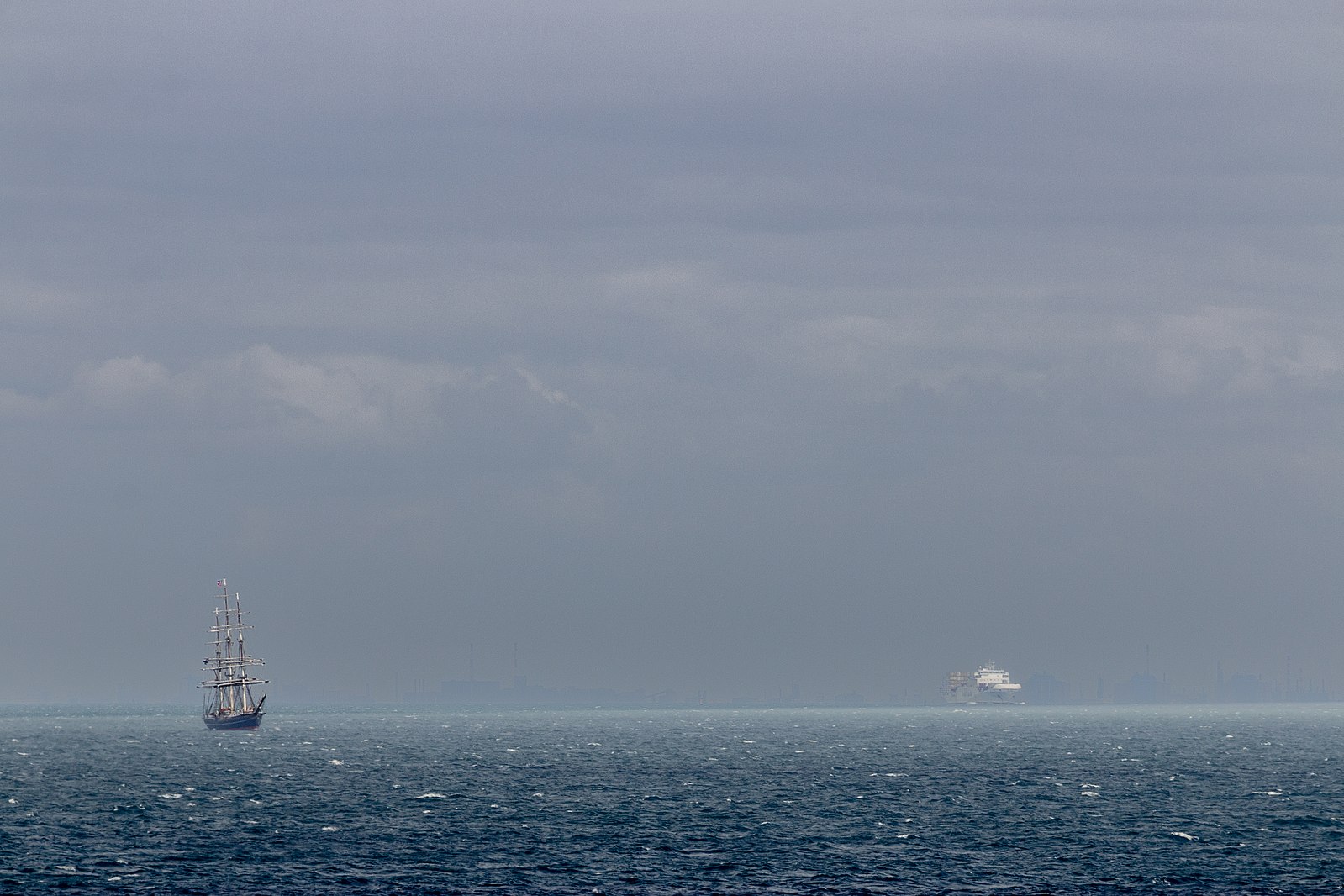The Seizure of A Russian Merchant Vessel Raises Questions About Neutrality
During armed conflict, can neutral states seize belligerent merchant vessels on the high seas and retain their neutral status?

Amid the international response to Russia’s invasion of Ukraine, French warships recently relied on sanctions measures to intercept and seize a Russian merchant ship at sea. This detention raises an important question states should consider as they continue their attempts to impose costs on Russia: During armed conflict, can neutral states seize belligerent merchant vessels on the high seas and retain their neutral status?
On Feb. 19, Baltic Leader, a 127-meter Russian roll-on/roll-off (ro-ro) cargo ship, arrived in Rouen, Normandy, to on-load automobiles. The vessel departed France on Feb. 25 to deliver those vehicles to St. Petersburg. According to automatic information system (AIS) data, an hour before midnight, three French law enforcement vessels converged on and intercepted the ship about 25 nautical miles west of Camiers. French authorities then boarded, inspected, and seized the ship, escorting it to Boulogne-sur-Mer, where it arrived, according to AIS, at about 2 a.m. on Feb. 26. Baltic Leader remains in Boulogne, while Russia has objected to the detention.
The Sanctions Regime
French authorities detained Baltic Leader pursuant to European Union (EU) sanctions against the Russian Federation. The sanctions regime on which France relied is nearly as complex as the history of the present conflict between Ukraine and Russia. The EU’s sanctions regime began in 2014 with Council Regulation 269/2014 after Russia’s annexation of Crimea. Those measures permitted EU member states to take control of any asset belonging to any of the 21 Russian individuals listed in 269/2014 as responsible for undermining or threatening the territorial integrity, sovereignty and independence of Ukraine. The EU has expanded these measures every year since 2014. Hundreds of Russian entities and individuals are currently subject to the EU sanctions regime.
On Feb. 23, a few days after Baltic Leader moored in Normandy, the EU updated its sanctions against Russia, via EU regulation 2022/260. The update was triggered by the Russian Federation’s recognition of Donetsk and Luhansk as independent states and Russia’s invasion of Ukraine, acts that have been condemned internationally. Like other revisions, this recent update adds individuals and entities to the sanctions list. Promsvyazbank, a Russian state-owned bank, and its chief executive officer, Pyotr Fradkov, were among the additions because they are believed to provide financial support to the Russian military and defense industry.
The United States also established a Russian sanctions regime in March 2014 after the annexation of Crimea. The U.S. sanctions regime has been expanded regularly. A recent update took place on Feb. 22 when the U.S. Department of the Treasury’s Office of Foreign Assets Control (OFAC) added Promsvyazbank, among other entities, to the sanctions list. OFAC additionally listed five Russian-flagged vessels reportedly owned by a Promsvyazbank subsidiary. Baltic Leader is one of the five. Apparently, based on this U.S. vessel ownership determination, French authorities concluded that the ship was an asset subject to seizure under the EU program, leading to the ship’s detention.
In 2018, the U.S. seizure of a merchant ship, M/V Wise Honest, at sea received international attention as a novel sanctions enforcement tool for deterring malign international actors—in that instance, North Korea. That seizure, however, differs from the current enforcement action in that Wise Honest was seized in furtherance of U.N. Security Council resolutions and not against a nation embroiled in an international armed conflict.
Law of Neutrality
A type of intervention less than war, economic sanctions are a civil means “to coerce, deter, punish, or shame entities that endanger [other nations’] interests or violate international norms of behavior.” Efficacy of economic sanctions aside, applying such measures against a state embroiled in an international armed conflict by seizing that state’s merchant ships raises questions about the relationship between sanctions enforcement and obligations of neutral states during an international armed conflict.
When nations are engaged in an international armed conflict, the relations among neutral powers and belligerent powers are regulated by the law of neutrality. This body of law looks to prevent neutral states from being drawn into war by establishing a clear distinction between belligerent and neutral powers. The law of neutrality’s core obligations are abstention and impartiality. Absent U.N. Security Council action that would permit deviations, neutral states must meet these obligations. Some observers have suggested that states may deviate from these obligations even without Security Council action to act against an aggressor (that is, so-called qualified neutrality), but this approach arose before the U.N. Charter and would undermine the neutrality regime.
In the maritime context, two treaties from the Second Hague Peace Conference in 1907 address neutrality obligations—Convention (XI) Relative to Certain Restrictions With Regard to the Exercise of the Right of Capture in Naval War and Convention (XIII) Concerning the Rights and Duties of Neutral Powers in Naval War. France and the United States are parties to the former. Russia, Ukraine, France and the United States are parties to the latter. These two conventions collectively recognize wartime guarantees for maritime commerce and legitimate business and the duty of neutral states to exercise impartiality toward belligerent vessels.
The law of neutrality does not prohibit commerce between a belligerent and a neutral. Rather, because maritime commerce is essential, even in times of war, this body of law regulates such behavior after the international armed conflict commences. Under these rules, neutral and belligerent states are free to engage in commerce as long as it does not involve carriage of contraband or contribute to the belligerent’s war-sustaining capability, such as importing raw materials to produce armaments or exporting products the proceeds of which a belligerent uses to purchase arms and armaments. Essentially, the law attempts to protect “neutral commerce” from unreasonable interference without promoting the flow of war materials.
Although the law of neutrality allows neutral and belligerent states to engage in neutral commerce, neutral states may choose to prohibit such activity. If a neutral state were to ban such commerce, however, it would be required to apply the ban consistent with the law of neutrality’s principal duties of abstention and impartiality among the belligerents.
Conclusion
Russia’s war against Ukraine, which has persisted since the annexation of Crimea in 2014, is an international armed conflict and thus triggers obligations under the law of neutrality. In this context, Baltic Leader was transporting automobiles, seemingly neutral commerce, when French authorities seized it. The seizure occurred without any supportive U.N. Security Council resolution and beyond territorial seas. It is unclear whether a Ukrainian-flagged merchant vessel engaged in similar trade would also have been seized, but it seems unlikely. Looking at these facts through a neutrality lens, the seizure of Baltic Leader leaves room for claims that the detention was an “unneutral act” that aided one side in the conflict and was inconsistent with international neutrality obligations.


-1928c983-394b-444d-b1ec-f6590b7d9fee.jpeg?sfvrsn=78498e1e_7)


